Salesforce Pardot – B2B Marketing Solutions To Boost Sales & ROI
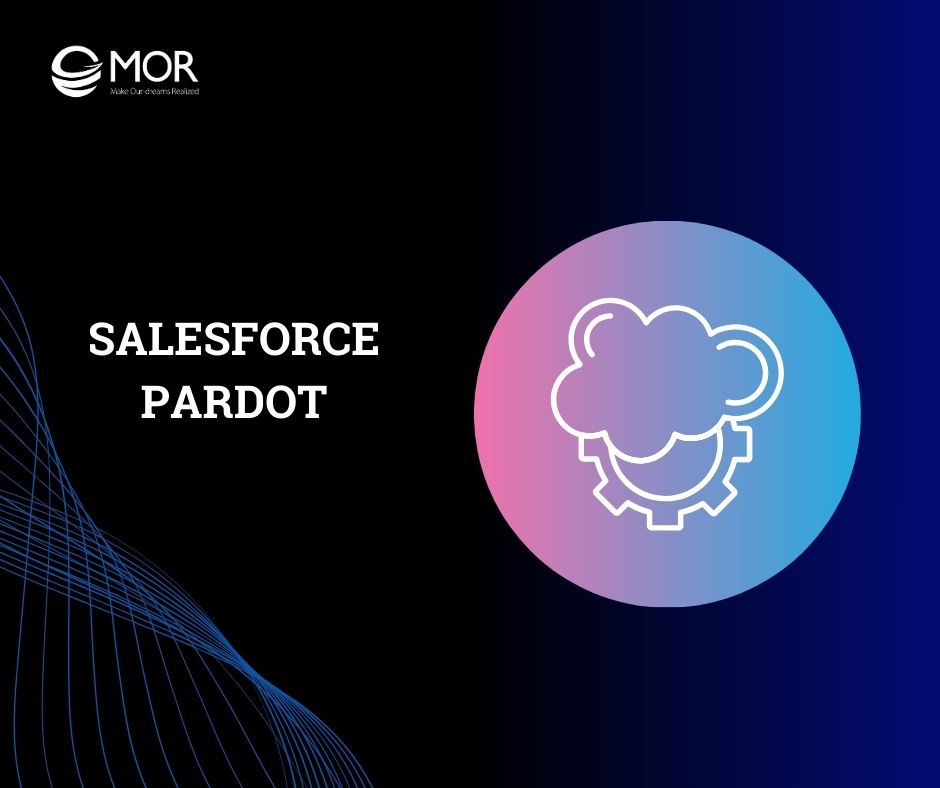
Is your B2B business searching for the most effective marketing automation solution to achieve sustainable growth? With salesforce pardot, even the most complex marketing strategies can be automated and managed more efficiently than ever. In this article, MOR Software will guide your business through how this platform empowers B2B marketing.
What Is Salesforce Pardot?
Salesforce Pardot is a powerful B2B marketing platform that helps businesses automate marketing campaigns, nurture leads, and generate detailed reports to measure ROI. Pardot integrates directly with Salesforce CRM, creating a seamless lead management process from marketing to sales.
Founded in 2007, Pardot was later acquired by Salesforce through the ExactTarget deal in 2013. In 2022, Salesforce rebranded Pardot as Marketing Cloud Account Engagement to align with its overall Marketing Cloud strategy, while maintaining its robust features for marketing automation, lead management, and Salesforce integration.
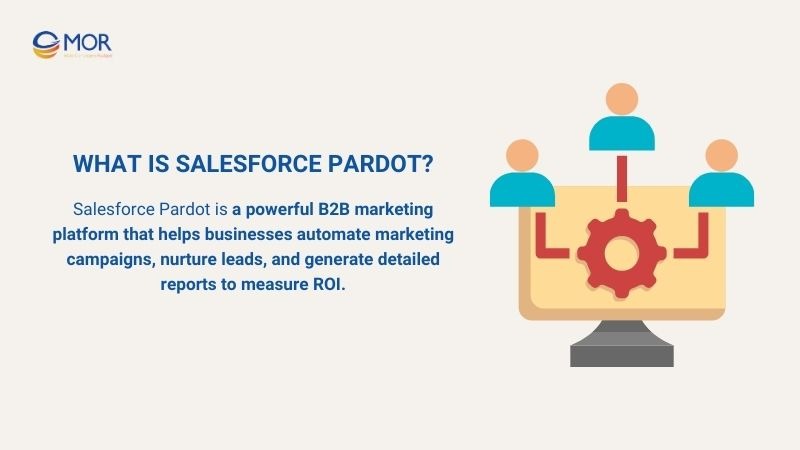
What Is Salesforce Pardot?
Key Differences Between Salesforce Marketing Cloud And Salesforce Pardot
When businesses look for a marketing automation solution, understanding the key differences between Salesforce Marketing Cloud and Salesforce Pardot (now Marketing Cloud Account Engagement) is essential. The following comparison provides a detailed overview to help businesses choose the right solution for their marketing needs.
Criteria | Salesforce Marketing Cloud | Salesforce Pardot (Marketing Cloud Account Engagement) |
Target Audience | Mainly B2C, businesses targeting large customer bases | B2B, businesses focused on nurturing and managing high-quality leads |
Primary Purpose | Multi-channel campaign management, email marketing, advertising, social media | B2B marketing automation, lead nurturing, converting prospects into customers |
Core Features | Email marketing, SMS, multi-channel advertising, customer behavior analytics | Lead scoring & grading, email automation, landing pages, forms, Engagement Studio |
Integration with Salesforce CRM | Integrates with Salesforce CRM, primarily for B2C customer data | Two-way sync with Salesforce CRM, seamless lead management (pardot salesforce integration) |
Ease of Use | Complex, requires training for managing multi-channel campaigns | User-friendly interface, easy for marketing and sales teams to implement |
Level of Personalization | Personalization based on behavior and B2C customer segmentation | Personalization based on lead score, ideal customer profile, and B2B engagement behavior |
Main Salesforce Pardot Features Driving B2B Marketing Automation
To maximize the effectiveness of B2B marketing, leveraging the full capabilities of Salesforce Pardot is essential. Here are the key features of Pardot that help businesses:
Lead generation tools
One of the core features of salesforce pardot is the ability to generate leads effectively for B2B businesses. The platform provides multiple tools to attract and capture customer information, including:
- Forms and landing pages: Allow creating customized registration forms and landing pages, easily integrated with websites or email marketing campaigns, helping increase the number of quality leads.
- Progressive Profiling: Automatically collects additional information from leads at different stages, optimizing customer data without disturbing users.
- Custom Call-to-Action (CTA): Create action buttons targeting the right audience, increasing the conversion rate from visits to leads.
With these tools, businesses can optimize the lead generation process while integrating data directly with salesforce CRM to manage leads seamlessly, supporting lead nurturing and B2B customer conversion campaigns.
Lead nurturing capabilities
Salesforce pardot helps businesses maintain contact and build relationships with potential customers through lead nurturing capabilities. Nurture tracks automatically send emails based on lead behavior and stage, while personalized flows customize messages according to the preferences and behavior of each customer.
For example: A B2B company providing project management software can create a nurture track sending a series of emails introducing features, case studies, and trial guides to new leads registering via forms on the website.
- Highly engaged leads are moved to a premium group for direct sales follow-up.
- Less engaged leads receive reminder emails or additional content, optimizing conversion potential.
Lead scoring and grading
Lead scoring and grading in pardot help B2B businesses identify high-quality leads effectively.
- Lead scoring: Evaluates the level of interest of leads based on interactions such as email opens, website visits, and content downloads.
- Lead grading: Categorizes leads based on the ideal customer profile to focus on those with high conversion potential.
This data is synchronized with salesforce CRM, allowing sales teams to focus on priority leads and optimize marketing campaign effectiveness.
Email marketing features in Pardot
Email marketing is an important tool in B2B campaigns. Pardot provides email templates and drip campaigns to implement automated campaigns and personalize them based on lead behavior.
The platform tracks opens, clicks, and responses to optimize content, sending time, and engagement rates. Email campaigns are also integrated with Salesforce CRM, ensuring seamless lead management.
Cross-campaign management
Pardot supports managing multiple campaigns simultaneously, allowing B2B businesses to monitor, analyze, and optimize several campaigns from one platform. Data from email, landing page, or webinar campaigns is consolidated.
It is synchronized with salesforce CRM, helping marketers evaluate overall effectiveness and adjust strategies promptly.
ROI reporting and marketing analytics
Salesforce Pardot provides ROI reporting and marketing analytics, enabling businesses to measure campaign effectiveness and link marketing activities to revenue. The platform supports custom dashboards to track key KPIs and analyze lead data, helping make strategic decisions to optimize B2B marketing effectiveness.
Salesforce Pardot Integration
The pardot salesforce integration is one of the greatest advantages of pardot. The platform synchronizes data bidirectionally with salesforce CRM, managing leads seamlessly from marketing to sales, improving workflows and automated notifications for sales teams.
For example: A B2B consulting company runs email and webinar campaigns. Pardot tracks leads from each campaign, identifies those converted to paying customers, and calculates ROI, allowing businesses to optimize marketing budgets and content strategies for future campaigns.
Advanced analytics and reporting
Salesforce pardot provides advanced analytics and reporting for B2B businesses to monitor and optimize campaigns. Tools such as Einstein Analytics analyze lead data, predict customer behavior, and provide strategic recommendations.
Custom dashboards allow tracking KPIs, evaluating campaign effectiveness, and improving marketing automation processes, enhancing the conversion of leads into customers.
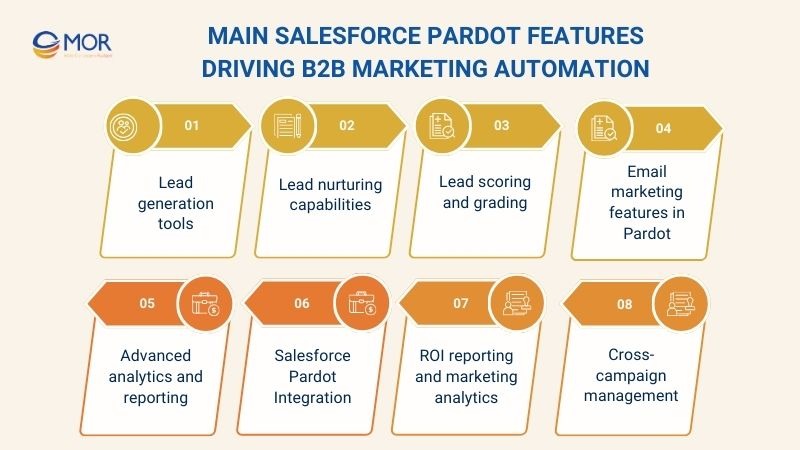
Main Salesforce Pardot Features Driving B2B Marketing Automation
Key Benefits Of Using Salesforce Pardot For Your Business
To enhance B2B marketing effectiveness, fully leveraging the features of salesforce pardot brings significant benefits to businesses. Here are some of the main advantages that companies can achieve
Increase high-quality leads
Using salesforce pardot helps B2B businesses attract more genuinely interested leads, improving overall conversion rates. Lead data is managed and synchronized with salesforce CRM, enabling the sales team to engage high-potential prospects immediately, reducing processing time and optimizing the handoff from marketing to sales.
Research shows the average B2B lead conversion rate is 2.9%. By implementing effective lead scoring strategies, businesses can significantly improve this rate, allowing them to focus on high-quality leads.
Track and convert customer behavior faster
One of the biggest advantages of implementing pardot salesforce integration is the ability to monitor prospect behavior in real time. Businesses see who is showing interest in their products or services and gain full visibility into the customer journey across emails, websites, and other digital touchpoints.
When the sales team receives instant notifications through pardot and salesforce integration, they can engage prospects at the exact “hot moment” when purchase intent is at its highest.
Build stronger customer relationships
Unlike broader marketing platforms, salesforce pardot is designed specifically for B2B marketing. Its pardot marketing automation allows businesses to nurture prospects and customers over time rather than relying only on one-off campaigns.
With pardot CRM integration, companies can personalize messaging for different segments, ensuring customers receive the right content at the right time. According to MarkinBlog, the conversion probability with existing customers is 60–70%, while for new customers it is only 5–20%.
Launch more precise email marketing campaigns
With pardot marketing, businesses can segment their audiences based on CRM data, web behavior, or prior engagement levels. Once accurate segmentation is in place, the system automatically delivers personalized email sequences tailored to each audience group.
This approach ensures higher relevance, reduces wasted spend on broad campaigns, and drives stronger performance. As a result, companies see improved open rates, click-through rates, and ultimately higher conversion rates from their email marketing efforts.
Measure and optimize campaign performance continuously
A standout feature of the pardot platform is its ability to provide detailed, visual reports that help businesses track the KPIs of each campaign. Beyond just email opens or clicks, Pardot connects directly with pardot CRM to pinpoint exactly which channels are generating real revenue.
For example, Bruntwood, a major UK real estate company, relaunched its campaigns through Pardot’s Engagement Studio. And then, they achieved impressive results with £5.18 million in revenue with an ROI of 17,650%.
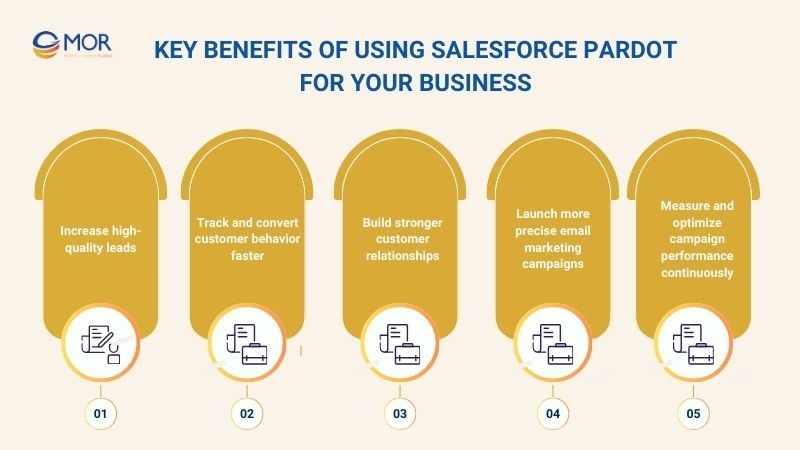
Key Benefits Of Using Salesforce Pardot For Your Business
Real Salesforce Pardot Use Cases In B2B Marketing
In the B2B marketing landscape, salesforce pardot is not just a marketing automation tool, but a comprehensive platform that empowers businesses. The following real-world use cases demonstrate how pardot marketing automation delivers measurable value and drives stronger results.
Lead Generation
In B2B marketing, generating and managing high-quality leads is always a major challenge. With pardot salesforce integration, data collected from forms and landing pages is instantly synchronized into pardot crm, allowing the system to automatically score and categorize leads based on their level of interest.
Real-world example:
A SaaS company in the HR management software industry faced difficulties when a large number of website sign-ups resulted in low conversion to paying customers. The marketing team decided to implement pardot and salesforce integration to improve lead quality and optimize the sales process.
Lead generation flow with salesforce pardot:
- Step 1: A user visits the landing page and submits their information through the form.
- Step 2: The information is immediately synchronized into pardot crm.
- Step 3: The system applies lead scoring to evaluate and segment prospects.
- Step 4: Qualified leads → sent directly to the sales team; unqualified leads → entered into automated nurturing workflows with personalized emails.
- Step 5: The sales team receives instant alerts for “hot leads” and engages them at the right time, significantly increasing the conversion rate.
Lead Nurturing Strategies
In B2B marketing, not every lead is ready to buy on their first interaction. With salesforce pardot, businesses can design effective lead-nurturing programs using pardot marketing automation, ensuring prospects are engaged with relevant and personalized content. This increases trust and shortens the sales cycle.
Real-world example:
A technology company providing supply chain management solutions noticed that many leads downloaded their whitepaper but did not take further buying actions. They implemented engagement studio through pardot salesforce integration to nurture leads with automated, personalized email journeys.
- Leads interested in Product A received a dedicated email series with in-depth content.
- Leads highly engaged with blogs were invited to webinars via automated emails.
- Once engagement scores reached the threshold, leads were automatically handed off to the sales team.
Pardot Campaign Management Features
Managing multi-channel campaigns can be resource-intensive and challenging to measure accurately. With pardot marketing, businesses can launch synchronized campaigns across email, landing pages, paid ads, and social media.
Real-world example:
A financial services company used salesforce pardot to run a multi-channel webinar campaign:
- Promoted the event through email and social media.
- A landing page integrated with registration forms, directly synced with pardot CRM.
- After the event, the system automatically sent follow-up emails and scored leads based on engagement.
- ROI reports displayed the number of attendees, cost per lead, and actual revenue generated from the campaign.
Sales Enablement With Salesforce Pardot
With detailed data from pardot crm, sales representatives know exactly how prospects are interacting with the brand and can approach them at the right moment with the right message. Instead of wasting time researching, they receive instant alerts on the most promising leads.
Real-world example: A manufacturing company leveraged salesforce pardot to enhance sales efficiency:
- When a prospect downloaded a product catalog, the system instantly sent an alert to the sales team.
- The sales dashboard displayed the full prospect journey: emails opened, pages visited, and content downloaded.
- With these insights, sales reps prepared tailored pitches, improving conversion rates significantly.
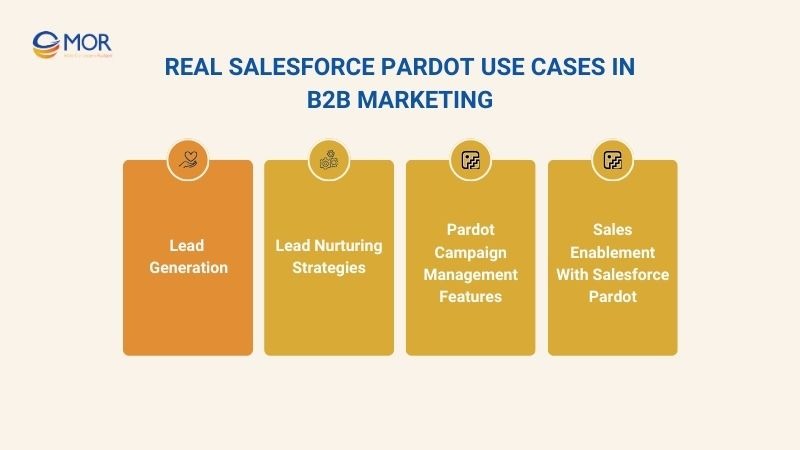
Real Salesforce Pardot Use Cases In B2B Marketing
Limitations Of Salesforce Pardot Compared To Other Automation Platforms
Although salesforce pardot delivers many benefits for B2B organizations, the platform also comes with certain limitations compared to other pardot marketing automation solutions. Below are some of the key drawbacks businesses should be aware of:
High Pricing Compared to Competitors
One of the most significant limitations of salesforce pardot is its relatively high pricing when compared to other pardot marketing automation platforms. With its pricing model based on the number of users and database size, implementation costs can quickly become a barrier for small and medium-sized enterprises (SMEs).
Even the basic plan of salesforce pardot costs thousands of dollars per year, while several other automation tools provide similar features at a much lower price point.
Pardot Does Not Have a Built-in CRM
Another limitation of salesforce pardot is that it does not come with a standalone CRM system. To fully leverage the power of pardot marketing automation, businesses are required to integrate it with salesforce CRM.
It also requires additional training compared to other marketing automation solutions that already include a built-in CRM. For SMEs, this can be a major drawback when evaluating the total cost of ownership.
Lead Scoring Can Be Basic
Although pardot salesforce integration provides a lead scoring feature to evaluate the potential of prospects, its customization capabilities remain fairly limited. Businesses with more complex sales cycles often need advanced scoring models that take into account variables.
As a result, sales teams may have to spend additional time manually qualifying and validating leads, which reduces overall efficiency in the sales process.
Customer Support is Not as Extensive
Compared to some other marketing automation platforms, customer support from salesforce pardot is considered less comprehensive. Many businesses often have to rely heavily on online documentation or user communities to troubleshoot issues.
Furthermore, according to customer feedback on SoftwareReviews, salesforce pardot scored only 76/100 in “satisfaction of cost relative to value”. It reflects that users feel the support and value delivered are not fully aligned with the premium cost.
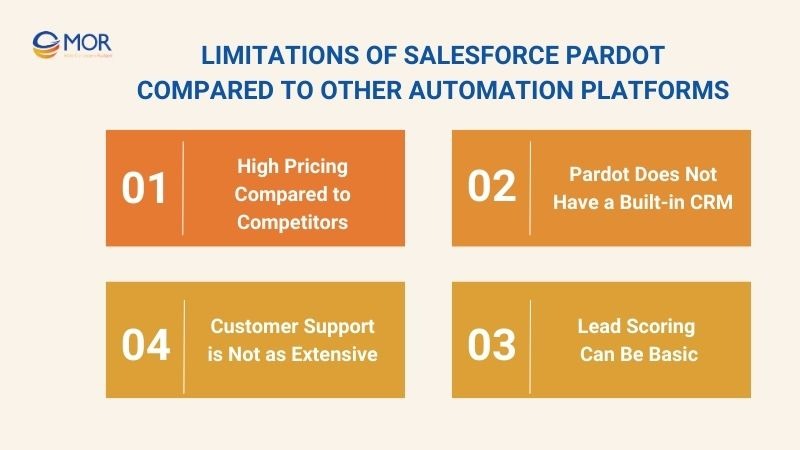
Limitations Of Salesforce Pardot Compared To Other Automation Platforms
How Much Does Salesforce Pardot Cost?
Cost is always a critical factor when businesses evaluate implementing salesforce pardot. The platform offers several pricing plans tailored to different business sizes and needs.
Plan | Description | Key Features | Price (USD/month) |
Pardot Growth Plan | Ideal for businesses starting with Pardot marketing automation and lead management | Lead nurturing and scoring, Engagement history dashboards, Campaign reporting & insights | $1,250/month |
Pardot Plus Plan | Designed for mid-sized businesses that need multi-channel campaign capabilities | Cross-channel journeys, Multitouch & ABM dashboards, B2B marketing analytics | $2,750/month |
Pardot Advanced Plan | Built for larger enterprises leveraging AI and advanced automation features | Dedicated IP address, AI-powered capabilities, Business units & sandboxes | $4,440/month |
Pardot Premium Plan | Full enterprise-level solution with maximum scalability and dedicated support | All previous features included, Premier success plan, Enhanced performance & SLA support | $15,000/month |
Why Choose MOR Software As Your Salesforce Pardot Implementation Partner?
When implementing salesforce pardot, choosing the right partner not only saves time but also ensures long-term success. With MOR Software, businesses gain a trusted partner that delivers both expertise and proven results.
- Certified Salesforce Consulting Partner: MOR Software is an official salesforce consulting partner, giving businesses confidence in its credibility and specialized implementation capabilities.
- Internationally recognized standards: The company has achieved CMMI Level 3 certification and complies with ISO 9001:2015 and ISO/IEC 27001:2013, proving the professionalism and reliability of its processes.
- Award-winning reputation: MOR Software has been honored with the prestigious Sao Khue Award every year from 2020 to 2024, highlighting its strong position as one of Vietnam’s leading IT service providers.
- Extensive Salesforce implementation experience: With expertise in integrating CRM, AI, and Big Data into digital transformation projects, MOR Software helps businesses maximize the value of salesforce pardot marketing automation and accelerate B2B growth.
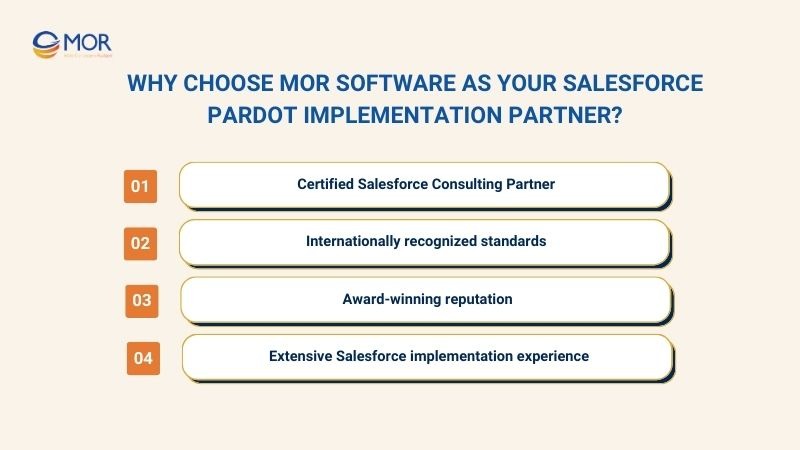
Why Choose MOR Software As Your Salesforce Pardot Implementation Partner?
In Conclusion
Salesforce pardot delivers exceptional advantages for B2B marketing. However, to implement it successfully and align it with the unique needs of your business, partnering with an experienced provider like MOR Software ensures cost optimization, reduced risks, and faster time to success. Get in touch with MOR Software today to start your salesforce pardot implementation journey and elevate your B2B marketing strategy to the next level.
Rate this article
0
over 5.0 based on 0 reviews
Your rating on this news:
Name
*Email
*Write your comment
*Send your comment
1